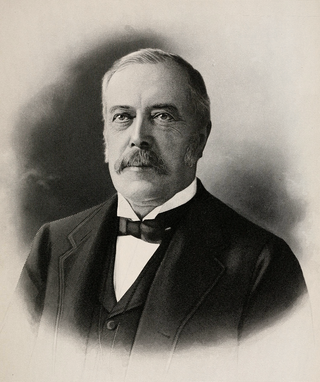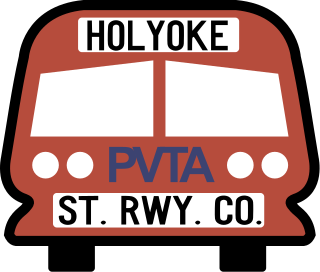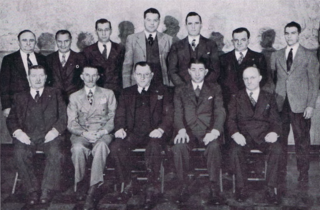
Holyoke is a city in Hampden County, Massachusetts, United States, that lies between the western bank of the Connecticut River and the Mount Tom Range. As of the 2020 census, the city had a population of 38,247. Located 8 miles (13 km) north of Springfield, Holyoke is part of the Springfield Metropolitan Area, one of the two distinct metropolitan areas in Massachusetts.

Kimberly-Clark Corporation is an American multinational personal care corporation that produces mostly paper-based consumer products. The company manufactures sanitary paper products and surgical & medical instruments. Kimberly-Clark brand name products include Kleenex facial tissue, Kotex feminine hygiene products, Cottonelle, Scott and Andrex toilet paper, Wypall utility wipes, KimWipes scientific cleaning wipes and Huggies disposable diapers and baby wipes.

William Fairfield Whiting was United States secretary of commerce from August 22, 1928, to March 4, 1929, during the last months of the administration of Calvin Coolidge.
NewPage was a leading producer of printing and specialty papers in North America with $3.1 billion in net sales for the year ended December 31, 2012. NewPage was headquartered in Miamisburg, Ohio, and owned paper mills in Kentucky, Maine, Maryland, Michigan, Minnesota and Wisconsin. These mills have a total annual production capacity of approximately 3.5 million tons of paper.

William Whiting was an American businessman and politician from Holyoke, Massachusetts. Whiting descended from an English family who first settled in Lynn, Massachusetts, during 1636.

Paper is a thin nonwoven material traditionally made from a combination of milled plant and textile fibres. The first paper-like plant-based writing sheet was papyrus in Egypt, but the first true papermaking process was documented in China during the Eastern Han period, traditionally attributed to the court official Cai Lun. This plant-puree conglomerate produced by pulp mills and paper mills was used for writing, drawing, and money. During the 8th century, Chinese paper making spread to the Islamic world, replacing papyrus. By the 11th century, papermaking was brought to Europe, where it replaced animal-skin-based parchment and wood panels. By the 13th century, papermaking was refined with paper mills using waterwheels in Spain. Later improvements to the papermaking process came in 19th century Europe with the invention of wood-based papers.

George Perkins Bissell Alderman, often referred to as George P. B. Alderman was an American architect who was active in western Massachusetts and Connecticut during the late 19th and early 20th Century.
The History of Papermaking in New York had its beginnings in the late 18th century, at a time when linen and cotton rags were the primary source of fibers in the manufacturing process. By 1850 there were more than 106 paper mills in New York, more than in any other state. A landmark in the history of papermaking in the United States was the installation of the first Fourdrinier machine in the country at a mill in Saugerties, New York, in 1827. Papermaking from ground-wood pulp began in New York in 1869, with the establishment of the Hudson River Pulp & Paper Company in Corinth and also with the work of Illustrious Remington and his sons in Watertown. The innovation and success of the Remingtons spurred further development of the industry in the state.

This article addresses the history of papermaking in Massachusetts.

This is a bibliography of Holyoke, a city in Massachusetts, with books about the area's history, culture, geography, and people. Due to the area's proximity to a number of industrial developments and the numerous cultures of different waves of immigrant workers, a wide number of books, dissertations, and comprehensive articles have been written about Holyoke throughout its history in several languages. This list is not intended to be complete, authoritative, or exhaustive and does not include promotional material, travel guides, recipe books, directories, or the catalogs of industrial companies that have resided therein.

The Holyoke Street Railway (HSR) was an interurban streetcar and bus system operating in Holyoke, Massachusetts as well as surrounding communities with connections in Amherst, Belchertown, Chicopee, Easthampton, Granby, Northampton, Pelham, South Hadley, Sunderland, Westfield, and West Springfield. Throughout its history the railway system shaped the cultural institutions of Mount Tom, being operator of the mountain's famous summit houses, one of which hosted President McKinley, the Mount Tom Railroad, and the trolley park at the opposite end of this funicular line, Mountain Park.

During the late 19th and early 20th centuries Holyoke saw an influx of Franco-Americans, predominantly French-Canadians, who immigrated to Massachusetts to work in the city's growing textile and paper mills. By 1900, 1 in 3 people in Holyoke were of French-Canadian descent, and a 1913 survey of French Americans in the United States found Holyoke, along with other Massachusetts cities, to have a larger community of French or French-Canadian born residents than those of New Orleans or Chicago at that time. Initially faced with discrimination for the use of their labor by mill owners to undermine unionization, as well as for their creation of separate French institutions as part of the La Survivance movement, this demographic quickly gained representation in the city's development and civic institutions. Holyoke was at one time a cultural hub for French-Canadian Americans; the Saint-Jean-Baptiste Society of America was first organized in the city in 1899, along with a number of other institutions, including theater and drama societies from which famed vaudevillian Eva Tanguay was first discovered, and regular publications, with its largest French weekly newspaper, La Justice, published from 1904 to 1964. The city was also home to author Jacques Ducharme, whose 1943 book The Shadows of the Trees, published by Harper, was one of the first non-fiction English accounts of New England's French and French-Canadian diaspora.

The Parsons Paper Company was an American pulp and paper company specializing in cotton-based fine writing papers, based in Holyoke, Massachusetts. Founded in 1853 by Joseph C. Parsons, it was the first and, as of 2023, the last paper manufacturer extant in that city, from 1989 until its liquidation in 2005. In 2008 the company's primary mill was razed in a large fire.

Despite representing a significantly smaller population than their Irish, French, Polish, or Puerto Rican counterparts, in the late 19th century through the mid-20th century, German immigrants predominantly from Saxony and Rhineland played a significant economic, cultural, and political role in the history of Holyoke, Massachusetts. The influx of these immigrants can largely be attributed to a single mill and millworker complex, the Germania Woolen Mills, which formed the basis of the immigrant colony that would make the ward encompassing the South Holyoke neighborhood that with the highest German population per capita, in all of New England by 1875. Along with unionization efforts by the Irish community, Germans would also play a key role in the city and region's socialist labor movements as workers organized for higher pay and improved living conditions in the textile and paper mill economies.

Whiting Farms is a neighborhood in Holyoke, Massachusetts, located to the southwest of the city center, approximately 2 miles (3.2 km) from downtown. Following the construction of Whiting Farms Road in 1961, the area was developed as a residential and commercial area in the 1960s and 1970s. Its name derives from its original use as site of the farm of William Whiting, where the former mayor and papermaker bred a prizewinning herd of Jersey cattle in the late 19th and early 20th century, many of which were sold for breeding to all parts of the country. A disastrous fire caused by arson in 1919 would kill off the entire herd of 75 head, and following this the farm, then-owned by William F. Whiting, became largely defunct. At the end of the Second World War it was proposed that the property be redeveloped into an airpark, however these plans would never come to fruition. Shortly after another case of arson in 1967 which destroyed a remaining barn, the property began to see the medium-density residential development that characterizes it today, with the First Whiting Farms Cooperative Housing breaking ground later that year. Initially criticized as the "Road to Nowhere" during Samuel Resnic's administration in the early 1960s, Whiting Farms Road today serves as a major artery for retail businesses and traffic to I-91 in the area.
This is a timeline of the history of the city of Holyoke, Massachusetts, USA.

From the beginning of the city's history as the western bank of Springfield, Irish families have resided in and contributed to the development of the civics and culture of Holyoke, Massachusetts. Among the first appellations given to the city were the handles "Ireland", "Ireland Parish", or "Ireland Depot", after the village was designated the 3rd Parish of West Springfield in 1786. Initially occupied by a mixture of Yankee English and Irish Protestant families, many of whom belonged to the Baptist community of Elmwood, from 1840 through 1870 the area saw a large influx of Irish Catholic workers, immigrants to the United States, initially from the exodus of the Great Famine. During that period Irish immigrants and their descendants comprised the largest demographic in Holyoke and built much of the early city's infrastructure, including the dams, canals, and factories. Facing early hardships from Anti-Irish sentiment, Holyoke's Irish would largely build the early labor movement of the city's textile and paper mills, and remained active in the national Irish nationalist and Gaelic revival movements of the United States, with the Holyoke Philo-Celtic Society being one of 13 signatory organizations creating the Gaelic League of America, an early 20th century American counterpart of Conradh na Gaeilge.
As of the 2010 United States Census, there were 39,880 people, 15,361 households, and 9,329 families residing in the city of Holyoke, Massachusetts. The population density was 723.6/km2 (1,874/mi²). There were 16,384 housing units at an average density of 277.2/km2 (718.6/mi²).

















